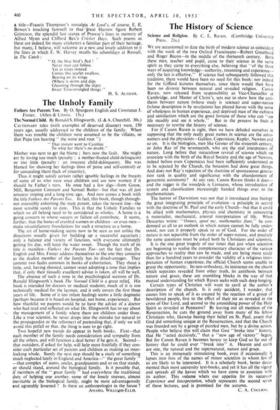The History of Science
WE are accustomed to date the birth of modern science as coincident with the work of the two Oxford Franciscans—Robert Greathead and Roger Bacon—in the middle of the thirteenth century. Both these men, teacher and pupil, came to their science in the same spirit as they came to everything else, belieVing that "of the three ways of acquiring knowledge—authority, reasoning and experience— only the last is effective." If science had subsequently followed this tradition, there would have been no need for this book: nor indeed for the Gifford lectures themselves, since there would then have been no divorce between natural and revealed religion. Canon Raven, now released from responsibility as Vice-Chancellor at Cambridge, and Master of Christ's, sets out to show how the anti- thesis between nature (whose study is science) and super-nature (whose description is by revelation) has played havoc with the sense of wholeness in human experience, and deprived man of the richness and satisfaction which are the good fortune of those who can –see life steadily and see it whole." But in the process he finds it necessary to rewrite the history of science.
For if Canon Raven is right, then we have deluded ourselves in supposing that the only really great names in science Are the astro- nomers and the physicists—Galileo, Copernicus, Kepler, Newton and so on. It is the biologists, men like Gesner of the sixteenth century, or John Ray 'of the seventeenth, who are the real interpreters of nature. Long before that miraculous. revival of science which we associate with the birth of the Royal Society and_ the age of Newton, indeed before even Copernicus had been sufficiently understood as to be rejected by the Church, the botanists had done great things. And does not Ray's rejection of the doctrine of spontaneous genera- tion rank in quality and significance with the abandonment of geocentric astronomy? At any rate, Canon Raven thinks it does— and the nigger in the woodpile is Linnaeus, whose introduction of system and classification increasingly handed things over to the mathematician.
The horror of Darwinism was not that it introduced into biology the great integrating principle of evolution—a principle in accord with the doctrine of St. Paul and the early Church—but that it could be allied with mathematics, physics and chemistry in concocting a materialist, mechanical, amoral interpretation of life. When Descartes wrote: "Omnes, apud me, mathematice hunt," he con- demned us all to an outlook in which nature cannot be fully under- stood, nor can it properly speak to us of God. For the order of nature is not separable from the order of super-nature, and precisely the same questions must be asked both by Christians and scientists.
It is the one great tragedy of our times that just when scientists are beginning to realise the complementary character of the various approaches to reality-that can be made, and are being more ready than for a hundred years to consider the validity of a religious inter- pretation of human experience, the official Church seems unable to grasp the opportunity. Its neo-orthodoxy, its insistence on the chasm which separates revealed from Other truth, its antithesis between nature and grace, these are stumbling blocks in the way of that mutual understanding for which Raven seeks with such deep longing.
Certain types of Christian will want to cavil at the author's description of the church. Is it only accident, I wonder, that causes him to speak of it as created by the reaction of a group of bewildered people, first to the effect of their sin as revealed in the cross of Our Lord, and second to the astonishing power of the Holy Spirit as revealed at Pentecost? By leaving out all mention of the Resurrection, he cuts the -ground away from many of his fellow Christians who, likewise basing their belief on St. Paul, assert that God did something unique at the Resurrection, and that the Church was founded not by a group of puzzled men, but by a divine action. People who believe this will claim that God "broke into" history, that He "acted decisively," that a "new age of victory" began. But for Canon Raven it becomes heresy to keep God so far out of history that he could ever "break into" it. Heaven and earth are one, the natural and the supernatural, nature and grace.
This is an immensely stimulating book, even if occasionally it lapses into lists of the names of minor scientists in whom few of us are likely to be interested. It is a scholarly book, better docu- mented than most university text-books, and yet it has all the vigour and spreads all the havoc which we have come to associate with its author. This volume whets DUI appetite for its successor Experience and Interpretation, which represents the second series of these lectures, and is promised for the autumn.
C. A. COULSON.


































 Previous page
Previous page